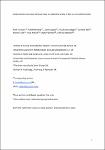Social workers and acquired brain injury: A systematic review of the current evidence-base.
| dc.contributor.author | Linden, M | |
| dc.contributor.author | Holloway, M | |
| dc.contributor.author | Cooper, C | |
| dc.contributor.author | Amadiegwu, A | |
| dc.contributor.author | Bald, C | |
| dc.contributor.author | Mantell, A | |
| dc.contributor.author | Norman, A | |
| dc.contributor.author | Bateman, A | |
| dc.date.accessioned | 2023-09-22T11:32:06Z | |
| dc.date.available | 2023-09-22T11:32:06Z | |
| dc.date.issued | 2023-11-10 | |
| dc.identifier.issn | 1932-6203 | |
| dc.identifier.issn | 1932-6203 | |
| dc.identifier.other | e0292128 | |
| dc.identifier.uri | https://pearl.plymouth.ac.uk/handle/10026.1/21340 | |
| dc.description.abstract |
Social work plays an important role in the assessment and treatment of people with acquired brain injury. Acquired brain injury is a complex and highly prevalent condition which can impact on cognitive, emotional and social domains. As acquired brain injury is a hidden disability it can be misdiagnosed or classified as another condition entirely. We sought to systematically explore the evidence base to examine how social workers have been prepared to work with their clients with brain injury. Employing six electronic databases (Social Policy & Practice, Web of Science, Scopus, PubMed, PsycINFO, CINAHL Plus) we reviewed 1071 papers. After applying eligibility criteria 17 papers were included in this review. We utilised standardised data extraction and quality appraisal tools to assess all included papers. Following appraisal, 9 papers were judged as possessing high methodological quality whilst 8 were judged as medium. Employing narrative synthesis, we identified four themes which captured the key findings of these papers. Themes were named as (i) advocacy and social work (ii) training and multidisciplinary team working (iii) inclusion of social networks and (iv) societal barriers. In order to meet their statutory responsibilities to practice safely, social workers must receive training in how to identify ABI and develop understanding of its consequences and subsequent need for provision. Social workers are also in a unique position to advocate for their clients and should make every effort to ensure their needs are met. | |
| dc.format.extent | e0292128-e0292128 | |
| dc.format.medium | Electronic-eCollection | |
| dc.language | en | |
| dc.publisher | Public Library of Science | |
| dc.subject | Humans | |
| dc.subject | Social Workers | |
| dc.subject | Social Work | |
| dc.subject | Employment | |
| dc.subject | Brain Injuries | |
| dc.title | Social workers and acquired brain injury: A systematic review of the current evidence-base. | |
| dc.type | journal-article | |
| dc.type | Review | |
| plymouth.author-url | https://www.ncbi.nlm.nih.gov/pubmed/37948455 | |
| plymouth.issue | 11 | |
| plymouth.volume | 18 | |
| plymouth.publication-status | Published online | |
| plymouth.journal | PLoS ONE | |
| dc.identifier.doi | 10.1371/journal.pone.0292128 | |
| plymouth.organisational-group | |Plymouth | |
| plymouth.organisational-group | |Plymouth|Research Groups | |
| plymouth.organisational-group | |Plymouth|Research Groups|Centre for Brain, Cognition and Behaviour (CBCB) | |
| plymouth.organisational-group | |Plymouth|Research Groups|Centre for Brain, Cognition and Behaviour (CBCB)|Behaviour | |
| plymouth.organisational-group | |Plymouth|Faculty of Health | |
| plymouth.organisational-group | |Plymouth|Faculty of Health|School of Psychology | |
| plymouth.organisational-group | |Plymouth|REF 2021 Researchers by UoA | |
| plymouth.organisational-group | |Plymouth|Users by role | |
| plymouth.organisational-group | |Plymouth|Users by role|Academics | |
| plymouth.organisational-group | |Plymouth|REF 2021 Researchers by UoA|UoA04 Psychology, Psychiatry and Neuroscience | |
| dc.publisher.place | United States | |
| dcterms.dateAccepted | 2023-09-13 | |
| dc.date.updated | 2023-09-22T11:32:04Z | |
| dc.rights.embargodate | 2023-12-6 | |
| dc.identifier.eissn | 1932-6203 | |
| rioxxterms.versionofrecord | 10.1371/journal.pone.0292128 |


